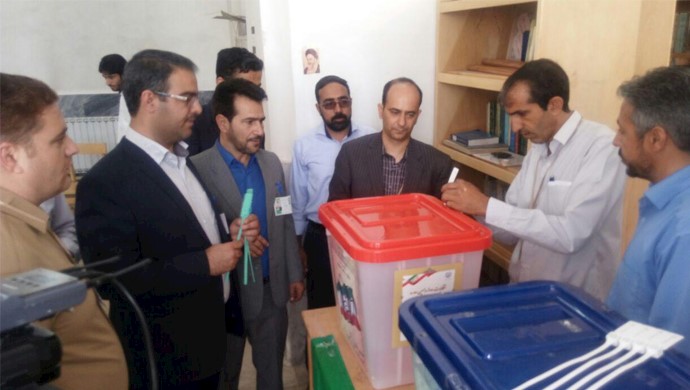Analysis by PMOI/MEK
Iran, February 1, 2020—The crises surrounding the upcoming parliamentary elections (February 21) are intensifying every day, creating further tension and infighting among the different factions of the Iranian regime. The members of the so-called “reformist” camp, who are fearing their share of power and wealth diminishing, are threatening to boycott the elections and avoid taking part. Meanwhile, Iranian regime president Hassan Rouhani has made implicit threats to foil plans to “engineer” the elections.
The results of Iran’s elections are determined not by the vote of the people, but by the interests and needs of the regime. The regime usually engineers the elections to have an outcome that is favorable for the supreme leader Ali Khamenei. Now, in their rivalries over power and wealth, the regime’s different factions are threatening to disrupt the process for the entire regime.
Two serious threats
The regime faces two serious threats as the parliamentary elections close in. First is low turnout, indicating a widespread boycott of the regime’s sham elections by the people. As Ali Movahedi Kermani, Khamenei’s representative in Tehran, said during this week’s Friday prayers, “Let us hope that we don’t hear of a low turnout in the elections.”
The second is the erosion of the regime’s plan to fix the vote counts to its benefit, which might happen as a result of conflicting interests between different regime factions. Either of these outcomes will be a manifestation of the regime’s weakening state and further drive a wedge in the already-widening rifts inside the regime. In 2009, similar events led to nationwide uprisings that drove the regime to the ledge of collapse.
But this time, such events will have even deeper implications for the regime, because they will be happening against the backdrop of severe setbacks for the regime. On the one hand, the ruling mullahs are still reeling from the aftermath of the November uprisings, which overtook more than 190 cities and resulted in the destruction of many regime centers. The society is still in an explosive state, and the Iranian people, outraged from the brutal suppression of the nationwide protests, are looking for any opportunity to take to the streets and vent their anger and disdain at their rulers.
On the other hand, the regime is faced with increasing international isolation, has lost its top terrorist general Qassem Soleimani, and is under the pressure of international sanctions over its illicit activities.
The signs of the widening rifts in the regime show themselves on a daily basis by officials, who in their rivalries further expose the endemic corruption that plagues the entire regime. A stark example is recent remarks Iranian regime MP Mahmoud Sadeghi, who tweeted on Monday, “In this round of elections middlemen have on some occasions demanded up to 40 billion rials (about $300,000) [to ensure the candidate is] approved. What a parliament it is going to be!”
Sadeghi’s remarks have clear meanings:
First, the regime’s vetting system for parliamentary candidates is a business that serves the interests of thieves that run the country.
Second, the Majlis (parliament) itself is a house of bribery and collusion.
Third, the Guardian Council, the supposed body that vets the candidates for qualification, is the looting middleman that is under the direct control of Khamenei himself.
Fourth, it shows once again that the entire structure of the regime has been designed for the mullahs to plunder the wealth and resources of the country. Parliamentary elections are just one of its many examples.
At the same time, Khamenei and his associates have been busy striking back at their rivals. The past months have seen several cases of corruption-related charges against relatives of high-profile officials with ties to Rouhani, including his brother Hossein, the brother of First VP Eshaq Jahangiri, the son-in-law of labor minister Mohammad Shariatmadari, and others.
Interestingly, the corruption cases and the disclosures are also reminiscent of the televised debates that took place in the runup to the 2009 elections, which eventually led to the explosion of social protests.
Fear of uprisings
Presently, Khamenei is at a dangerous crossroads. On the one hand, he can choose to remove his rivals to make his regime seamless and put a lid on the infighting that is spinning out of control. But as Iranian MP Mohammad Dehghan, a Khamenei associate, had previously warned, such a move can “make the country unstable and the [MEK] will take advantage of this situation,” by which he means that uprisings will flare up again.
On the other hand, if Khamenei does nothing, it means that he will have to accept the current worsening situation, which again is driving his regime toward further instability and unrest and can pave the way for nationwide protests.
As the National Council of Resistance of Iran (NCRI) stipulated in its yearly statement, “The current state of the Iranian society will not allow Khamenei to close the widening gaps in his regime. The past year has shown that the rulers can’t rule as before and the people will no longer accept whatever their rulers impose on them. The expansion of popular protests and the exacerbating power struggle in the regime’s own ranks underline this reality.”





